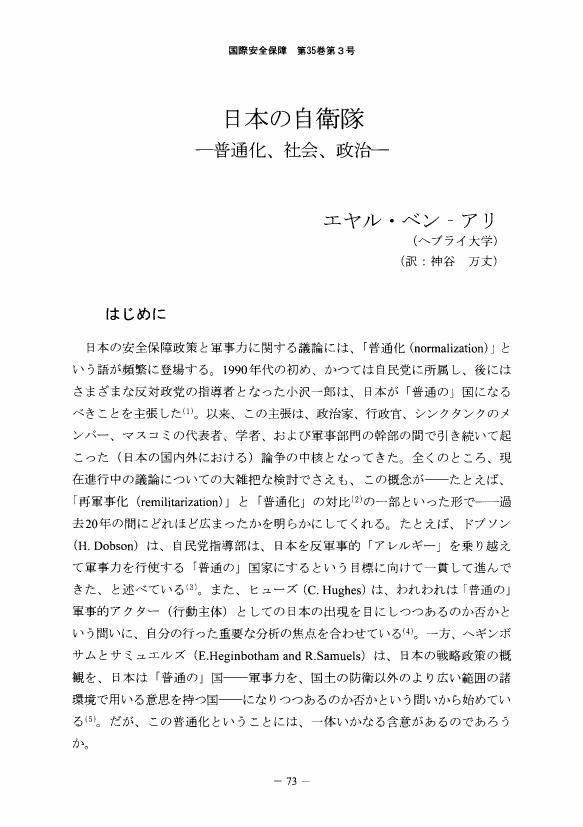9 0 0 0 OA 日本的現実主義者のナショナリズム観
- 著者
- 神谷 万丈
- 出版者
- 一般財団法人 日本国際政治学会
- 雑誌
- 国際政治 (ISSN:04542215)
- 巻号頁・発行日
- vol.2012, no.170, pp.170_15-170_29, 2012-10-25 (Released:2014-10-26)
- 参考文献数
- 89
Throughout the postwar period, realism has been the dominant school of thought in academic international relations (IR) communities in the United States and Europe. During the same period, in the IR community in Japan,there has been a group of scholars called genjitsushugi-sha, which literally translated means “realist(s)”. (Genjitsushugi literally means “realism,” and “sha” means “a person” or “people.”) Unlike realism in the Western IR communities, genjitushugi was not a dominant school of thought in Japan during the Cold War years. In the 1960s and 1970s, the Japanese IR community witnessed a harsh debate between genjitushugi-sha and risoushugi-sha (idealist[s]) over the role of military power in postwar international politics and the desirability of the “Japan-U.S. Security Treaty system” (i.e., the U.S.-Japan alliance) for Japan. In the Japanese society at that time, where strong pacifist orientation was widely shared, it was idealists, who denied the utility of military power in the contemporary international relations and insisted on the policy of unarmed neutrality for the security of Japan, who represented the mainstream view. Although Japanese genjitsushugi-sha have significant resemblances to Western realists, such as the recognition of the struggle for power as a continuing nature of international politics and the acceptance of the utility of military power in the postwar world, substantial differences also exist between the two. The previous research done by the author shows that genjitsushugi-sha recognized the decreasing utility of military power in international politics as early as the early 1960s. They also noticed variations in the utility of power resources depending on issue areas by the early 1970s. In these senses, the genjitsushugi-sha’s view on power shows considerably liberal tendencies. This article argues that their view on nationalism also has liberal, rather than realist, inclinations. While realism is a particularistic theory, liberalism is universalistic. Realist and liberal views on nationalism should reflect such natures of respective theories. The analysis in this article shows that Japanese genjitsushugi-sha’s view on nationalism shows strongly universalistic tendencies. In the face of the revival of nationalism among the Japanese citizens since the mid-sixties, genjitsushugi-sha argued: 1) that Japanese diplomacy should reduce the dependence on the U.S.; 2) but that Japan, as a trading country with a limited military power, could maintain its security and prosperity only with close cooperation with other countries,particularly the U.S., and increasingly so under the deepening interdependence in the postwar world; 3) that Japan, therefore, should not define its national interests in a narrow, egoistic sense, 4) and that the Japanese people should pursue nationalism that is internationalist in nature. Despite the conventional view that regards Japanese genjitsushugi-sha as (a subspecies of) realists in Western IR terms, this article argues that they were rather “realistic liberal” scholars.
3 0 0 0 OA 日本的現実主義者のパワー観
- 著者
- 神谷 万丈
- 出版者
- 国際安全保障学会
- 雑誌
- 国際安全保障 (ISSN:13467573)
- 巻号頁・発行日
- vol.39, no.4, pp.66-81, 2012-03-31 (Released:2022-04-14)
1 0 0 0 OA 梅本 哲也 著『アメリカの世界戦略と国際秩序―覇権、核兵器、RMA』
- 著者
- 神谷 万丈
- 出版者
- 国際安全保障学会
- 雑誌
- 国際安全保障 (ISSN:13467573)
- 巻号頁・発行日
- vol.38, no.2, pp.104-108, 2010-09-30 (Released:2022-04-14)
1 0 0 0 OA 日本の自衛隊 ―普通化、社会、政治―
- 著者
- エヤル・ベン‐アリ 神谷 万丈
- 出版者
- 国際安全保障学会
- 雑誌
- 国際安全保障 (ISSN:13467573)
- 巻号頁・発行日
- vol.35, no.3, pp.73-94, 2007-12-31 (Released:2022-04-20)
1 0 0 0 OA 序論:米国の安全保障政策 ―冷戦終結から9・11へ
- 著者
- 神谷 万丈
- 出版者
- 国際安全保障学会
- 雑誌
- 国際安全保障 (ISSN:13467573)
- 巻号頁・発行日
- vol.29, no.2, pp.1-4, 2001-09-30 (Released:2022-04-28)
1 0 0 0 OA 核武装論―当たり前の話をしようではないか
- 著者
- 神谷 万丈
- 出版者
- 一般社団法人 日本原子力学会
- 雑誌
- 日本原子力学会誌ATOMOΣ (ISSN:18822606)
- 巻号頁・発行日
- vol.49, no.11-12, pp.787, 2007 (Released:2019-04-16)



